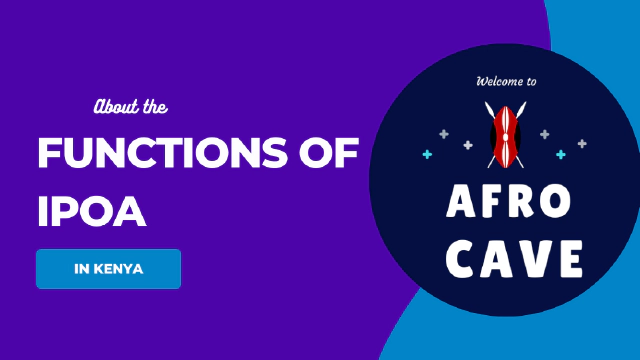The Independent Policing Oversight Authority (IPOA) provides for civilian oversight over the work of the police in Kenya. The Independent Policing Oversight Authority Act established IPOA in 2011.
The Act also provides for the functions and powers of the Independent Policing Oversight Authority.
The headquarters of the Authority are in Nairobi. However, it shall devolve its services to the counties according to Article 6 of the Constitution.
Table of Contents Show/Hide
Functions of the Independent Policing Oversight Authority (IPOA)
The functions of the Independent Policing Oversight Authority (IPOA) are in Section 6 of the Independent Policing Oversight Authority Act.
1. To investigate deaths and serious injuries caused by police action
IPOA investigates deaths and serious injuries arising from police action. Thereafter, it recommends disciplinary action or prosecution. This aims at preventing impunity and enhancing accountability within the National Police Service.
2. To investigate police misconduct
The Independent Policing Oversight Authority receives complaints from members of the public on police misconduct. It then undertakes independent investigations.
The Authority also receives complaints from police officers against fellow officers.
IPOA can initiate investigations on its own motion. It may refer cases to appropriate bodies, including seeking the court’s intervention to have its recommendations implemented.
3. To monitor, review and audit investigations and actions by the Internal Affairs Unit of the police
IPOA oversees the work of the Internal Affairs Unit (IAU) of the police. It plays this role to verify independently that the internal police system deals with complaints against officers fairly and effectively.
IPOA shall keep a record of all such complaints regardless of where they have been first reported and what action has been taken.
The Authority can take over investigations if not satisfied with IAU’s intervention.
4. To conduct inspections of police premises
This seeks to ensure that:
- police premises meet basic predefined standards, and
- that treatment of suspects and detainees is in line with the principles laid down in the Constitution.
Police premises include police stations and police posts, detention facilities and officers’ residential areas. IPOA prepares inspection reports and shares them with the relevant Authorities.
5. To monitor and investigate policing operations and deployment
The Independent Policing Oversight Authority scrutinises independently policing operations affecting members of the public. IPOA plays this role to ensure policing is conducted for the benefit of the people of Kenya.
Where it detects the excessive use of force and abuse of power, it recommends independent investigations and remedial action.
6. To review the functioning of the internal disciplinary process
The Authority monitors internal police disciplinary processes to ensure fairness and effectiveness.
It may conduct surveys to assess improvement in police internal accountability mechanisms.
7. Reporting on its activities
The law mandates the Independent Policing Oversight Authority to prepare a performance report every six months and an annual report. The report shall:
- inform the public on IPOA activities, and
- provide recommendations for the improvement of the functioning of the National Police Service.
Subject to the Constitution and the laws related to freedom of information, IPOA shall publish findings of its investigations, monitoring, reviews, and audits as it sees fit, including by means of the electronic or printed media.
8. To open its services to the public
IPOA shall take all reasonable steps to facilitate access to the Authority’s services to the public.
9. To make recommendations
The Independent Policing Oversight Authority shall make recommendations to the National Police Service or any State organ.
10. Cooperate with other institutions
It shall also co-operate with other institutions on issues of Police oversight, including other State organs in relation to the services they offer.
11. Present information to the court
IPOA shall present any information it deems appropriate to an inquest conducted by a court of law.
Independence of the Independent Policing Oversight Authority (IPOA)
IPOA shall operate independently. It shall not be subject to any person, office, or authority.
The Authority shall observe the principle of impartiality and rules of natural justice when exercising its powers and performing its functions.
Every Government officer or institution shall accord the Authority such assistance and protection as may be necessary to ensure its independence, impartiality, dignity, and effectiveness.
No person or body shall interfere with the decision making, functioning or operations of the Authority.
Lastly, Parliament shall ensure that the funding for the Independent Policing Oversight Authority is adequate. This will ensure it performs all its functions effectively and efficiently.
The Objectives of the Independent Policing Oversight Authority (IPOA)
The objectives of the Authority are to–
- hold the Police accountable to the public while performing their functions;
- give effect to the provision of Article 244 of the Constitution that the Police shall strive for professionalism and discipline and shall promote and practice transparency and accountability; and
- ensure independent oversight of the handling of complaints by the Service.
For the powers of the Independent Policing Oversight Authority (IPOA), see section 7 of the Independent Policing Oversight Authority Act.(External Link)
For more about the Independent Policing Oversight Authority (IPOA), visit their website.
See Also: How to Lodge a Complaint with IPOA.

